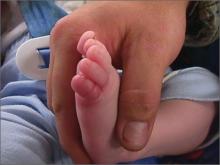Upon closer inspection, the physicians discovered hair thread tourniquets constricting the fourth and fifth toes on the baby’s left foot.
Hair tourniquet syndrome primarily affects infants in the first few months of life. The average age of occurrence is 4 months, a time when maternal postpartum hair loss is at its maximum.
Toes are most frequently involved, although cases of hair tourniquets affecting the fingers, penis, labia, clitoris, and uvula have been reported.
To remove this patient’s hair tourniquets, the physician carefully cut the fibers with hooked Littauer suture-removal scissors and unwrapped the hair. Damage to the plantar aspect of both toes was significant enough that the physician had to cut through the soft tissue and into the flexor tendon to completely remove the hair. No sutures were required, as the wound edges were well approximated without closure.
The injured toes were cleaned and dressed. The patient’s recovery was complete and uneventful.
Adapted from: Moore EP, Strout TD, Saucier JR. Photo Rounds: Crying infant with painful toes. J Fam Pract. 2012;61:675-677.


